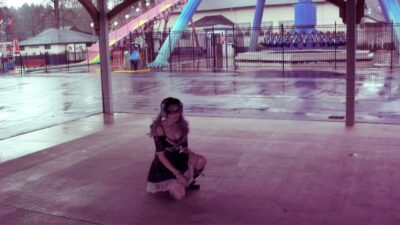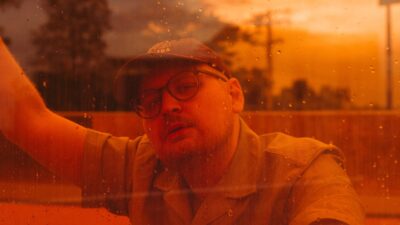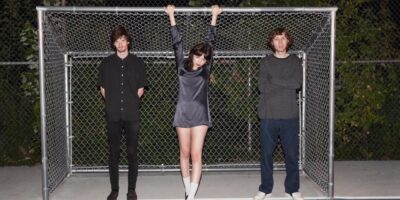Philadelphia’s Hurry is one of the premiere power pop projects of the last decade. Blossoming from the fuzzed out noise pop of their debut album, EVERYTHING/NOTHING, in 2014, they’re back with the chiming, hooky, muscular and more assured sound of their fourth album FAKE IDEAS. Faced with delaying the album for a year after COVID, frontman Matt Scottoline decided to publish a companion book alongside the album in which he interviewed various people who helped record and release the album, including his bandmates, the studio’s engineer/mixer, people who run his label Lame-O Records, and Frances Quinlan of Hop Along, who painted the album’s cover. The result is incredibly affecting in how it personalizes the process of making and releasing an album, and the human connections and relationships involved. I sat down with Matt to discuss the book, the new album, newfound confidence in songwriting, Teenage Fanclub, and the state of power pop.
Was the book concept initially what you had in mind with the release of the album all along, or was it something that came about while you had time to reflect with the album delayed under quarantine?
Matt Scottoline: It was the latter for sure. Y’know I didn’t even really get to the point where I could form initial plans for what the release would look like, just because we finished recording at the end of February in 2020. So it was only a few weeks before the pandemic started, and at that point I didn’t even really care anymore about the record. The book concept came last summer, when I was starting to feel a little more normal and adjust to the situation—and I think with that sense of normalcy I started to get antsy, and started to think of creative projects I could take on. Typically I can’t really write new music until my plate is kind of clear, so having that record hanging over me took the inspiration from me. I was trying to think of other stuff I could do that would scratch that itch and let me be creative. I started tossing around some writing ideas in my head—things that were interview focused.
There was a magazine I used to read called Wooooo that this writer Jason Crombie in New York used to publish. Its final form is pretty similar to how my book is, it was these little published books with like a lot of off the cuff interviews. He’d interview really wide ranges of people—he’d interview, like, an amateur skateboarder, and then he’d interview James Franco. It was all over the place, and the conversations always had a vibe of almost like he called all these people without them knowing it was ever going to happen, and it was crazy. Whether it was or wasn’t, it just had a fun vibe and the conversations were really entertaining to read because of that. So, long story short, I was like, “Maybe I can do something along those lines,” and I kind of went back and forth.
At first I was just gonna talk to other musicians I knew, things like that, and I talked myself out of it. Y’know, as a writer, it’s very easy to talk yourself out of things, or ideas. But eventually, because I read this other book by writer AJ Jacobs that was called Thanks A Thousand. That book is really focused on gratitude, it’s this project where he decided to thank everybody who made his daily coffee possible, and in doing that he talked to not only baristas and coffee grocers, but to the factory that makes the little sleeves on the cup. He went everywhere. I’ve been a fan of his for a long time. So I stole the inspiration from there a little bit, and that’s what pivoted it into being something related to the record. The more I thought about it, the more I thought this was something that puts faces to the names in liner notes, and maybe give people a wider picture of everything and maybe humanize the whole record a little bit.
For sure! I really like the whole concept. It’s very PAY IT FORWARD, in a way. I almost feel a bit meta talking to you right now, since this interview is meant to further promote the album, so in some small capacity I’m now entrenched in the story of this album.
MS: I’m going to need to interview you after this.
Exactly! It’s going to become a Charlie Kaufman movie or something like that. Reading the book, one thing I really liked about it was the fly on the wall portraits of the connections you have with these various people you have involved in the process. Being in the industry, too, independent music is so reliant on these networks of people and friends, with everyone’s enthusiasm driving everything. It was a really cool snapshot of all these relationships with all these various people, and it all culminated in the making of this album. On a very basic level, it’s a celebration of all of these people helping you in expressing your music and your art. It’s interesting to read your interpersonal rapport with each person from chapter to chapter and how you interact with them, but also going further down the rabbit hole and detailing who these people are and what their contribution to the album is.
MS: That’s cool, I’m glad that was your experience with it. Everyone who pre-ordered the album got a copy of the book, and to your point I wanted those people—the people who really cared the most, and are engaging with the physical object—they’re the people who I’d hope would appreciate the book and have the kind of insights you’re having.
Yeah it’s a more tangible relationship with the record. I’ve always been interested in reading liner notes, seeing who produced or engineered a record, and cataloguing that network of people. I feel like nowadays, that information is harder to come by unless a band posts it on their Bandcamp page, or you check Discogs or something. Unless it’s advertised or part of the pitch of the record, it’s a bit harder to find who was responsible for producing or engineering a record.
MS: Totally. It sucks! Most people are primarily engaged with music on streaming platforms, and the data’s not there. Especially for indie and things that don’t have a Wikipedia page.
Not to pontificate on it too much, but when you lose that physical, tangible element, you start to lose the humanity, man.
MS: Well, you’re right! That’s the thing. The way I feel is, even when you do read those names—if you’re someone who cares about that stuff, and you buy records, and you read the liner notes—95% of time, all you do is look at it and you’re like, “Oh, I know that name.” Even if it’s someone that you know and you’re like “I recognize that producer, I really like their work,” it’s still kind of all you got. You know that name. Those people don’t really have the outlet, that they necessarily want people to know everything about them, or what their personality is, but I think there’s power in humanizing that stuff a little bit.
It’s definitely something that makes the book companion all the more richer. You see these snapshots of these people involved, and gain this insight into the dynamic you have with them, and get a deeper dive than you would normally from scanning the liner notes. Speaking of the record in and of itself, there’s definitely some more intricate, layered arrangements on the record. I feel like on a sonic level you and the band were trying to expand the palette, as it were. There’s horns on songs, and organs, and some little electronic flourishes and touches. Were you conscious about doing that, or did the songs just call for it on this record?
MS: The songs called for it. The only way that I was conscious of it was because I think doing things like that and expanding a bit required a level of confidence that I don’t know that I’ve had on previous records. The more I’ve done it, the more confident I’ve gotten. I think on this one there was less hesitation with some of that stuff. In general I was just more willing to not sweat it so much.
That kind of seems to be a running thread in the book too, when you’re talking with the other band memories. You refer to previous iterations of Hurry in this past tense way. There’s a sense that the moment the album was recorded, the band had kind of coalesced, and you finally had this backing band for the project that you could be confident in. It beefs up the arrangements, I’m sure, having a full band behind you.
MS: The people in the band who play with me, they’ve seen the way the band has sort of changed and evolved on my whims and my ideas as I’ve figured it out for myself. I spent a lot of time trying to pinpoint what Hurry was to me as a songwriting project, and in doing that I was overthinking it a little bit. I’ve got it to a point now where I’ve just comfortably realized that it’s just me and it’s just going to be what it is. I think that’s helped in a lot of ways.
It comes across in the songwriting—i think it’s definitely your tightest, catchiest collection of songs for sure. All the arrangements make the songs shine. A lot of previous Hurry records dealt with your anxiety, and were lyrically focused on that perspective. You’re still treading that ground, but you also sound a little more self-assured, or like you’re having little moments of breakthroughs. It’s the most confident Hurry album for sure.
MS: I think it is too, and I think your observation’s right. Through the year, year and a half that I was writing the songs on the record, it was a time when I made the most headway and progress with my anxiety through therapy and things like that. So there was a lot of excitement on my end of not being cured or anything, but when you have those moments of clarity and you sort of feel you kind of understand why you feel the way you feel. I understand that it’s not real, or it’s something that I can deal with. I mean, there’s a reason the album is called FAKE IDEAS, and that feeling permeates the whole thing.
And it’s in the song too! “Everything I think about myself / Was created in my mind / and twisted over time / to make a fake idea start feeling true.”
MS: That’s almost a direct quote from my therapist.
Tracing the earlier Hurry records to this one, I feel like your early releases have more of a scuzzy, almost dream-pop or shoegaze influence to them—integrated in a way that bands like Teenage Fanclub or Sloan or Deerhunter do. That’s not to say that those influences aren’t present on FAKE IDEAS. “Keep Being Yourself” has these intricate, layered guitars that are building, and there’s still some fuzzy, scuzzy guitar tones on the record, but I feel like they’re augmented a bit and more muscular in the approach. Combined with the more tightly arranged song structures, were there any reference points you were thinking about?
MS: It’s funny you brought up Teenage Fanclub, because obviously I’m a big fan of them. I’m willing to admit in this conversation that I was sort of myopic in my enjoyment of them for a long time. I was listening to BANDWAGONESQUE, and I was listening to THIRTEEN, and I was listening to GRAND PRIX, and I didn’t really venture beyond that too much. I was just stuck in there, really enjoying that stuff. This ties back into the confidence thing. What I started to do… I started to listen to SONGS FROM NORTHERN BRITAIN, and even HOWDY! a little bit, and moving on through there. I saw a lot of myself in the trajectory of that band. When they were newer, when they were younger, they were trying to fit with the times and access these tones and aesthetics that were ‘of the moment’ in their songwriting, and it kept evolving. Eventually, in my opinion, on SONGS FROM NORTHERN BRITAIN, I feel like they found the truest essence of Teenage Fanclub, and it stayed that way. I guess there’s part of me that FAKE IDEAS could be my version of that album, in that sense.
You referenced dream-pop and shoegaze and those sorts of aesthetics. When I started doing Hurry—tying again back to confidence—I was nervous. Even though at my core I wanted to write pop songs, I come from DIY punk and you can’t just do that—it’s like, okay, you can write a pop song if you want, but make it really loud and then no one will make fun of you. That’s the other half of it. I feel confident now and I’m not worried about having to satisfy this false bar of punkness—let’s just make these songs what they are and let them be what they are. I’m actually excited to continue writing music now, because I feel like I’ve unshackled myself.
That’s great to hear! The best is yet to come!
MS: I hope so. That’s probably what every musician feels like and then they release a horrible record right after that, so…
We’re not gonna jinx it! It’ll be good—I’m really looking forward to what you have next, for sure. We’re kind of in a moment for power pop right now, between you guys, and 2nd Grade, and Mo Troper in Portland.
MS: If my label could hear you right now, or my publicist… pretty much every time I submit a record, I’m always like, “Y’know, I think power pop is about to have its moment” and I’m always wrong. So I don’t believe you [laughs].
What do you think it is about power pop that makes it such an evergreen subgenre? It’s basically been unchanged for decades, even if bands can put their own little spin on it, and band-to-band there’s different tweaks and shade people make; it’s still the same basic set of paints being used.
MS: I’m gonna theorize here, and I don’t know if my hypothesis is right or not. Power pop exists as this genre that’s really accessible from a few different places. If you’re really into punk, or emo, or something, and that’s where you’ve been, you can find your way to power pop from there. Similar to what I was saying before, feeling like I always had to satisfy these “marks of cool”—I think power pop sort of never does that? And that’s kind of the magic of it, but it’s also why it’s not always this super popular genre of music—it’s never really of any moment. That’s also what’s super appealing about it getting into it; there’s always this treasure trove of stuff. Maybe this is true for every genre of music, but I do feel like with power pop, it’s essence is so steeped in history and it hasn’t really changed that much. Like, punk music evolves, hip hop evolves. Power pop—I feel bad saying it—I don’t feel like it evolves that much.
It’s a conservative genre, almost! It’s more reliant on history, as you said. It’s pretty much xeroxed Beatles and The Who worship, and The Byrds. The three basic colors.
MS: Your amps get nicer overtime, or something. I just feel like, from my own personal experience, finding that genre was a really refreshing escape. And it just opened that door to this bounty of history with that music. None of it really sounded dated, all of those traditional things that can slow you down from getting excited about a style of music. If you’re really into hip hop, and you listen to the OG hip hop and stuff from the late-‘70s, you might feel like, “This is cool, but I’m glad it’s not like this anymore,” or whatever. Power pop’s not like that. It’s just a beautiful little door you walk through. I don’t know why it’s more popular now. I’d love to hear why you think it’s more popular now. I’m not making that claim—you are [laughs].
Kind of like you’re saying, even if it’s not the most pervasively popular subgenre, there’s always going to be pockets of people making really good power pop at any given moment. There’s something to be said for the creative constraints of it. It’s a genre that’s more formulaic by nature. There’s more “rules” to how you write a power song, since it’s based on the standard Lennon-McCartney verse/chorus/verse/middle eight songwriting. Other genres can be more expansive and go any direction they want to. In power pop, the creativity comes from the constraints. People get really good at woodshedding these kinds of songs and sounds, and the permutations of it can derive rich reward.
MS: I have a new idea. Here’s my new theory: I’ve read recently that for young people—for like middle schoolers, high schoolers—music is no longer the sort of dominant driver of identity, the thing that makes you who you are the way it was for us, probably. Right now, video games are that thing—that’s the more defining thing for you. That’s probably true for people of all age groups, where no one really feels like, “Alright, I’m gonna be the guy who listens to punk music, and that’s who I am.” I think the shedding of that probably makes it easier for people to get into power pop—which is not a cool thing you want to associate with when you’re trying to figure out what makes you cool.
In the book you mentioned that you were going to attempt to become a better drummer by doing, as you call it, “The Ringo Challenge:” learning every Beatles song on your electronic drum kit. Have you made any progress in The Ringo Challenge?
MS: I did kind of start one day, and I was playing through the first Beatles album, and I got so bored. The early records have a lot of funny covers, I don’t know. I did dabble. I haven’t formalized it. I’m still open to the idea. We’ll see if the people demand it. If more people are asking, maybe it’ll happen.
















[…] totally agree! Earlier this year I did an interview with Matt from Hurry and we talked about how conservative a genre power pop is. It may be conservative in terms of the […]
[…] totally agree! Earlier this year I did an interview with Matt from Hurry and we talked about how conservative a genre power pop is. It may be conservative in terms of the […]